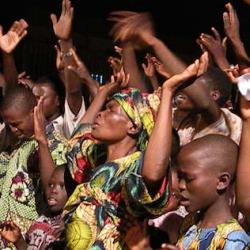In a wide-ranging, informative overview of US interests in Africa, Matthew Taylor King summarizes the optimistic narrative of African productivity that emerged in the early 2000s:
“In any given year, in a list of the world’s top ten economic performers, one would spot five or more African economies, such as Ethiopia, Botswana, Rwanda, or Côte d’Ivoire. Books published in the late 2000s boosted the idea of ‘Africa Rising,’ and soon Time and the Economist followed suit, dedicating covers to the narrative of an upwardly mobile continent.”
The past few years haven’t justified that optimism: “by the summer of 2016, per capita income was falling in sub-Saharan Africa for the first time in 20 years.”
One of the problems, he says, is an over-reliance on natural resources. Resource-rich countries should prosper, but in fact “the more abundant the resources of a given country, the less likely it is to enjoy broad-based development. After all, if resources alone determined the wealth and poverty of nations, the Democratic Republic of the Congo would be among the richest nations in the world.”
The reason natural resources don’t translate into rising standards of living is that “as a country’s resource exports boom, the value of its currency appreciates, and suddenly its other exports—such as manufactured goods—become more expensive and less competitive in international markets. In this way, resource exploitation can actually drive deindustrialization.”
The Netherlands suffered this phenomenon after they discovered oil, which is why it’s known as “Dutch disease.” Much of Africa suffers from it.
The negative effects of sales of natural resources depress manufacturing, which is what Africa needs: “only industrialization can generate the mass employment, export earnings, and capital accumulation that in turn spur sustained economic growth and allow countries to climb the rungs in the development ladder. Manufacturing creates a virtuous circle: Entrepreneurs accumulate capital and finance new businesses, while their employees purchase more products and pay more taxes with their higher wages.”
Its lack of manufacturing isn’t a lack of labor, even skilled labor. It’s a political and legal failure, a lack of security for property and a lack of consistency in policy. Investors aren’t willing to take the risk of pouring capital into “countries where caprice reigns.”
King pays close attention to religion as a political factor in contemporary Africa. Here is one place where African conflicts already become global causes: “South Sudanese rebels play up their Christian identity to win support from American Evangelicals, and suddenly the conflict in Sudan is about ‘black Christians’ versus ‘Arab Muslims’; the Iranian Foreign Minister condemns the killing of 347 Shi‘a Muslims in clashes with the Nigerian military, and Nigerian Shi‘a leaders appeal to Iran for protection and support; Boko Haram, initially waging a localized campaign against Western-style education, eventually declares its allegiance to the Islamic State and expands into a regional menace.”
Conflicts aren’t merely between Christian and Muslim. Intra-Christian conflicts simmer throughout the continent: “Within Christianity, Pentecostal churches are gaining at the expense of Catholic and mainline Protestant denominations.”
King is alarmed as the hard-core biblicism of some Protestants: “Uganda and Zambia in particular have seen their domestic politics come under the increasing influence of conservative Christian groups; for global human rights groups, the future will bring only more wrangling with Christian-dominated regimes that, reflecting internal public opinion, criminalize homosexuality and link state and church in ever-closer union.”
King’s prescriptions on the religious front amount to a plea for Africans to follow the maturation of Western Europe, nudge religion from the center of political life, secularize and calm down. Whatever the future holds for African Christianity, it’s unlikely that it will follow this well-trodden path, which has some glaring potholes of its own.












